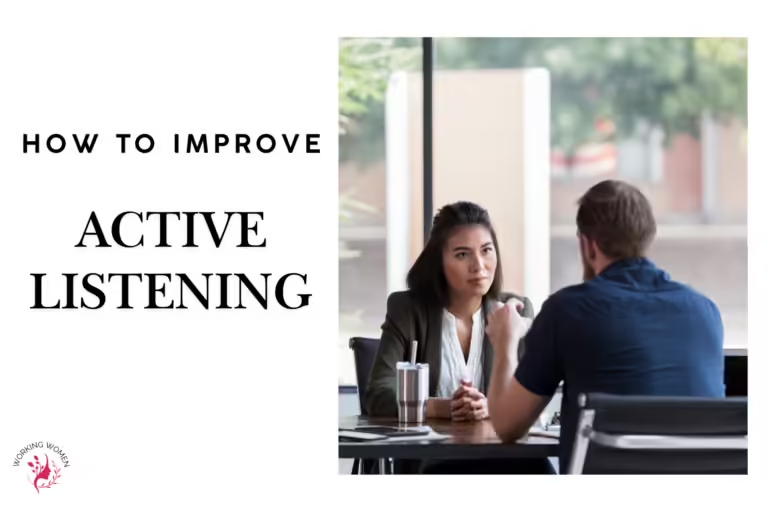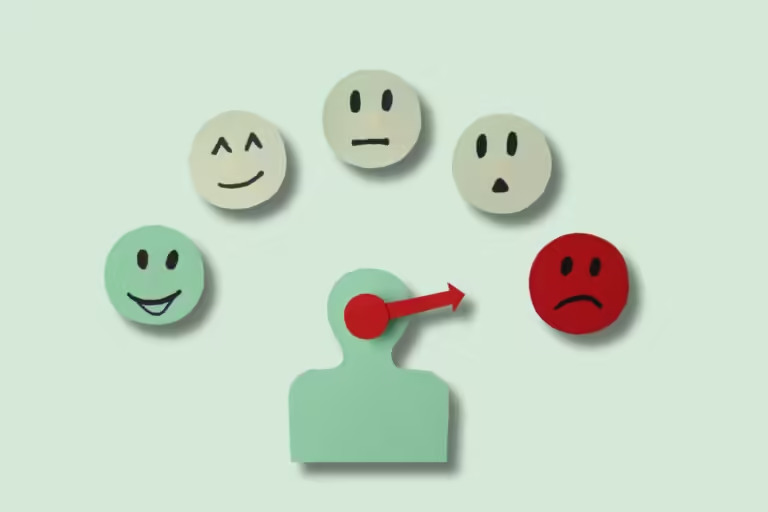Self-awareness to understand your strengths and areas of growth
Do you feel like you’re on a treadmill, sprinting endlessly with no end in sight? Constantly overwhelmed, juggling work, family, and that nagging feeling that you’re not doing anything well enough? If you find yourself always putting others first, sacrificing your own needs, and feeling resentful because of it, it’s time for a reality check.
Chances are, a lack of self-awareness is secretly sabotaging your happiness and success. As working women, we’re conditioned to be strong, capable, and endlessly giving. But without understanding our own emotions, limits, and true priorities, we risk burnout, unhealthy relationships, and a nagging sense of dissatisfaction.
This isn’t about blaming yourself, it’s about empowerment. In this article, I’ll expose the hidden ways that a lack of self-awareness trips us up in our careers and personal lives. More importantly, I’ll give you actionable tools to boost your self-awareness, create stronger boundaries, and reclaim control of your time and energy.
Imagine making decisions with confidence, feeling at peace with “no,” and having the energy to achieve the things that truly matter to you. That’s the power of self-awareness, and it’s within your reach. Ready to dive in?
what is the self awareness
Self-awareness means being attentive to your inner world, and recognizing how your thoughts, emotions, and values impact your actions and how others perceive you.
Self-awareness gives you a baseline to understand why you think and act the way you do. This helps make positive changes, grow as a person, and cultivate better relationships.
Self Awareness Definition
Self-awareness is the ability to understand your own thoughts, feelings, behaviors, strengths and weaknesses.
Psychologists Shelley Duval and Robert Wicklund defined self-awareness through their Objective Self awareness theory. Their theory suggests that when we focus our attention inward, we compare ourselves to our internal standards and ideals.
If we perceive a mismatch between who we currently are and who we aspire to be, it can trigger feelings of discomfort or negativity. This discomfort motivates us in two ways:
- Either we strive to change our behavior to better align with our standards
- or we seek to escape the uncomfortable feelings of self-scrutiny
Unlike some broader definitions, this theory highlights that self-awareness isn’t always a pleasant experience and can be a powerful catalyst for both personal growth and avoidance.
Table of Contents
Types of Self-awareness
Primarily, there are two kinds of self awareness.
Internal Self Awareness
According to Harvard Studies, internal self awareness is how clearly we understand our inner world (Values, beliefs, motivations, strengths, and weaknesses) and how they impact our reactions and choices.
For example: You are more internally self aware if you
- Recognizing specific emotions as they arise (anger, sadness, joy)
- Knowing what truly matters to you in life
- Being honest about your skills and areas for improvement
Tips to Develop: Mindfulness practices, journaling, reflection, introspection
This Harvard research reveals a powerful link between internal self-awareness and a fulfilling life. People with strong internal self-awareness experience greater job satisfaction, thriving relationships, and a strong sense of personal and social control. This self-knowledge empowers them to make choices aligned with their values, leading to greater happiness. Conversely, a lack of internal self-awareness can contribute to stress, anxiety, and depression.
External Self Awareness
Understanding how you are perceived by others and the impact you have on them. You may have experienced it at the workplace by giving a presentation, having a group conversation or in a meeting etc.
Examples:
- Being aware of your body language, tone of voice, and overall presence
- Understanding how your words and actions affect others’ emotions
Empathizing with others’ perspectives
How to Develop: Seeking honest feedback, observing how others react to you, paying attention to social cues.
Internal and external self-awareness work together. A strong understanding of your inner world helps you make choices aligned with who you are while being aware of your external impact allows you to communicate effectively and build strong relationships.
Importance & Benefits of Self-awareness
Personal Growth & Development
Self-awareness is the foundation of personal growth and empowerment. When you deeply understand your values, motivations, and unconscious biases that might influence you, you unlock the ability to make choices that truly align with your goals and aspirations.
Instead of reacting impulsively or settling for decisions that don’t serve you, self-awareness gives you the clarity to chart your course with intention. This leads to a greater sense of control over your life, increased confidence, and the ability to navigate challenges with resilience.
Stronger Relationships
Self-awareness allows you to step outside of yourself and cultivate empathy for others. When you understand your emotional triggers and communication patterns, you can better navigate difficult conversations, resolve conflict effectively, and build stronger connections with the people in your life. Self-awareness fosters genuineness, builds trust, and allows for a healthier expression of your needs both in personal and professional relationships.
Leadership & Career Success
Great leaders are deeply self-aware. They understand their strengths, weaknesses, and how their presence and decisions impact their teams. This self-knowledge breeds confidence, humility, and the ability to inspire others.
Self-aware leaders are more likely to seek feedback, adapt to change, and make strategic choices that consider the bigger picture, leading to greater success for themselves and their organizations.
Mental & Emotional wellbeing
Self-awareness promotes greater mental and emotional well-being. By recognizing your emotional patterns and triggers, you cultivate better self-regulation, reduce stress levels, and develop healthier coping mechanisms for life’s challenges.
When you live in alignment with your values and inner compass, you experience increased contentment, a deeper sense of purpose, and resilience in facing the ups and downs of life.
Myths about Self-awareness
Introspection Doesn’t Always Improve Self-Awareness
Introspection is the deliberate examination & reflection of your conscious thoughts, feelings, and sensations. It’s the process of looking inward to gain insights about your inner world.
Tasha Eurich, Organizational Psychologist & Principal of The Eurich Group, research revealed that the problem with introspection is not it is ineffective, but people are doing it wrong.
In her TED talk, she argues that the most common self-reflection question we ask (to become aware of our unconcious behaviour) is “Why?” – why am I feeling overwhelmed? Why did I have a poor performance review this year? However, she proposes that a more empowering approach is to ask “what?” questions. Instead of dwelling on the reasons behind challenges, we should ask ourselves “What can I do to better manage my workload?” or “What can I do to improve my performance next year?”
People become more self aware through experience
The assumption is that simply living life and accumulating experiences naturally leads to increased self-understanding. We might believe that facing challenges, successes, or changes automatically forces us to become more aware of ourselves.
Donald Schon, an influential theorist, emphasized the importance of “reflection-in-action” and “reflection-on-action” for professionals to learn from their experiences. He argued that expertise does not come from experience alone, but from consciously analyzing experiences to improve practice.
Experience can contribute to self-awareness if we’re intentional about it. Pairing experience with reflection, seeking feedback, and being open to learning is how we truly cultivate a deeper understanding of ourselves.
Some people are just naturally more self-aware than others.
While some may have a head start, self-awareness is absolutely a skill that can be learned and developed with practice. Studies show that mindfulness, therapy, and structured self-reflection techniques can greatly enhance self-awareness.
Depths of Self-Awareness: 10 Key Categories
Self-awareness is a multifaceted journey into understanding who you are and how you interact with your world. According to the Self awareness test here are 10 essential categories to consider for deepening your self-knowledge:
- Inner Self (Visual, Auditory, & Kinesthetic): How do you process information and experiences? Are you a visual, auditory, or kinesthetic learner?
- Personal Paradigm: What are the underlying assumptions and beliefs that shape your worldview?
- Personal Beliefs (Positive and Negative): What beliefs empower you, and which ones hold you back?
- Life Values: What principles matter most to you and guide your decisions?
- Inner Conflict: What are the recurring struggles or conflicting desires within yourself?
- Stress and Negativity Triggers: What situations or experiences provoke negative emotions and how do you react?
- Inner Parents: How do past experiences or messages from childhood impact your present-day thoughts and behaviors?
- Personal Limitations: What are your real or perceived limitations, and how do they affect your actions?
- Self-Sabotage: In what ways do you undermine your own success or happiness?
- Your Future: What are your dreams and goals, and how can self-awareness help you achieve them?
How to measure your Self-awareness
Measuring self-awareness is crucial because it unlocks the hidden blueprint of your behaviors, emotions, and how you impact the world around you. It acts as a compass for personal growth, illuminating blind spots, fostering stronger relationships, and fueling meaningful career success. By understanding your strengths, weaknesses, and the true motivations behind your actions, you gain the power to make informed choices, build unshakable resilience, and cultivate a life of genuine fulfillment and a step toward your full potential.
Here are several effective ways to measure your self-awareness, encompassing both internal and external aspects:
Self-awareness Quiz
Discover the power of self-awareness! Dr. Tasha Eurich’s expert team designed this free, insightful Quiz to reveal your inner strengths and blind spots. Take the quiz today and unlock a deeper understanding of yourself.
There are a few other free online tests that can help you measure your self awareness like INLP Centre.
Self-awareness Questions
- Personality Tests: Assessments like the Myers-Briggs Type Indicator (MBTI), DISC, or the Enneagram can offer insights into your tendencies, preferences, and how you interact with the world.
- Self-Awareness Questionnaires: There are various questionnaires designed to measure different aspects of self-awareness, including your emotional triggers, values, and blind spots. [Here’s one example: The Self-Awareness Outcomes Questionnaire (SAOQ)
- 360-Degree Feedback: This involves gathering assessments from people you interact with regularly (colleagues, managers, friends). It provides invaluable external perspective and highlights blind spots.
Reflection & Introspection
- Journaling: Regularly writing down your thoughts, feelings, and reactions to life events can reveal patterns and motivations you might otherwise miss.
- Mindfulness: Practicing non-judgmental observation of your thoughts and emotions helps you understand your inner workings in real-time.
- Therapy: A safe space with a therapist can guide deep exploration of your behaviors, motivations, and potential limiting beliefs.
Self-awareness & Emotional Intelligence (EQ)
According to the most popular theory of psychologist and Author Daniel Goleman, Emotional intelligence is the ability to understand, manage, and express your own emotions, and the emotions of others, in positive ways.
Goleman places self-awareness at the heart of his EQ model. He defines self-awareness as:
- Understanding your emotions, their triggers, and their impact on your behavior.
- Knowing your strengths, weaknesses, and values.
- Recognizing how others perceive you.
Without self-awareness, the other components of EQ crumble. For example, to regulate emotions, you must first recognize them. To understand how others feel, you must be attuned to your own inner world.
The five components of EQ are there.
The Five Components of Goleman’s EQ Model
Self-Awareness: As described above, this is the foundation of EQ.
Self-Regulation: The ability to manage your emotions, control impulses, and adapt to changing circumstances. Think of it as your internal thermostat for emotional responses.
Social Skills: The ability to build positive relationships, navigate social situations, communicate effectively, and influence others.
Empathy: The ability to sense, understand, and respond to the emotions of others. It’s about putting yourself in someone else’s shoes.
Motivation: The inner drive and optimism to achieve goals, take initiative, and bounce back from setbacks.
Goleman’s theory suggests that cultivating these components of EQ leads to greater success in personal and professional life. If you want to enhance your leadership abilities, build stronger relationships, or simply better understand yourself, investing in your emotional intelligence – starting with self-awareness – is a powerful step.
Conclusion
Self-awareness is a skill anyone can build with practice. Start by asking yourself: What are my emotional triggers? How do others perceive me? Where do my values and actions align, and where is there room for growth? Simple tools like journaling, seeking feedback, and mindfulness can be profound catalysts on your path to greater self-knowledge.
Remember self-awareness is a journey, not a destination. It’s a commitment to ongoing discovery and learning about the deepest parts of ourselves. By embracing this journey, we unlock the potential for greater self-acceptance, better decision-making, and a more fulfilling life guided by our authentic values.
FAQs
People often lack self-awareness due to Fear, fear of vulnerability, facing flaws, or the discomfort of change. Our self-perception can also be distorted, shielding us from seeing ourselves accurately. Past traumas or simply not having the right introspection tools further contribute to this lack of self-understanding.
Yes, narcissists generally display a significant lack of self-awareness. Their inflated sense of self and need for constant admiration prevent them from genuinely examining their flaws or shortcomings. They tend to project blame onto others and distort reality to maintain their grandiose self-image, hindering their ability to see themselves objectively.
Self-awareness is essential for leaders because it helps them make better decisions, build strong relationships, continuously grow, adapt to change, and act ethically. A self-aware leader understands their strengths, weaknesses, and how they impact others, leading to a more effective, trustworthy, and inspiring leadership style.
- Taking time for introspection: Regularly reflecting on your thoughts, feelings, and actions through journaling, meditation, or therapy.
- Actively seeking feedback: Asking trusted colleagues or friends for honest opinions about your strengths and areas for development.
- Recognizing emotional triggers: Noticing what situations or people tend to cause strong emotional reactions, and understanding why.
- Acknowledging biases: Identifying any unconscious assumptions or prejudices you may hold and how they might influence your decisions.
- Owning your mistakes: Taking responsibility when you mess up and focusing on learning from the experience instead of making excuses.






